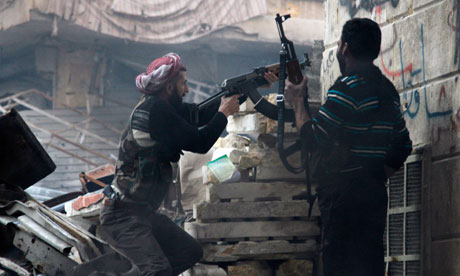On examining the US assessment of Syria’s alleged chemical weapons use, Vladimir Putin’s top foreign policy adviser, Yuri Ushakov, said: “What was presented to us by the Americans does not look convincing. It would be hard to even call them facts.”
Unwelcome as it may be to the French and British governments, who have been leading the push for this finding, he is right. The White House statement says that laboratory analyses of samples “reveal exposure to sarin” (which the NY Times reports amounts to two individuals, who have been shown to have traces of the agent sarin in their bodies), but then goes on to add the qualifier that “each positive result indicates that an individual was exposed to sarin, but it does not tell us how or where the individuals were exposed, or who was responsible for the dissemination”. Hardly a proverbial smoking gun. It is quite possibly, as Anthony Cordesman has noted, a “political ploy”. The finding rests, we are told, on “analysis” and “reporting”, but perhaps more candidly we should call it “supposition”.
In any event, these two governments have laboured mightily to get what they wanted – a peg, however flimsy, to validate arming the Syrian opposition. The Europeans’ rationale is that only by correcting the asymmetry of military power can President Assad be cajoled into serious negotiations with the opposition. But is this right? Will arming the opposition make the situation for the Syrian people better, or will it lead to more bloodshed?
Has the finding brought the crossing of a policy “red line” too? Well, no. The New York Times has detailed that the opposition has received, since the beginning of 2012, possibly as much as 3,500 tons of weapons, and lists the flights by which the materiel arrived, and from where they derived. This represents a huge air-bridge of munitions. Twenty odd years ago, I witnessed the arming of the mujahideen in Afghanistan in their battle against the Soviet forces. Then, a single cargo a month was thought substantial. At times, the Syrian opposition has been receiving one every other day.
Syria is already awash with weapons. But as we discovered in Afghanistan, however much is given, it is “never enough”, and if the opposition begins losing, inevitably it is the west’s failure to give more and better weapons that is the cause. Only with hindsight was it plain that the Afghan mujahideen’s problems began when “big money” became available from donors, the conflict became “business.”
Reuters, on Syria, tells us nothing has changed. It reports an incident on the Turkish-Syrian border where France’s recently recalled ambassador to Syria gave “a stash of brown envelopes stuffed with thousands of dollars” to “‘viable’ [that is, non-Al-Qaida] rebels operating in zones no longer under Bashar al-Assad’s control”.
A few weapons, more or less, will change nothing. Weapons will not stay with the preferred recipients: warlords will trade, as in Afghanistan. And no real shift in western policy has occurred either: the US deputy national security adviser has said there will be no escalation in the weapons supplied to the insurgents and that there will be no no-fly zones. Supplies already are at the limit of what can be safely given – and if advanced items ever were to reach al-Qaida this would be a huge 9/11 “hot button” event for the US.
Much of this is likely to be rehashed in the G8 meeting today, but Putin will denounce any escalation in arming the opposition and may threaten, as before, a counter-response. Iran’s new president, Hassan Rouhani, is unlikely to change his country’s policy on Syria either.
I am sure David Cameron finds the opposition fighters he meets to be decent human beings, and that he is moved to help them. But this war is complex: it directly cuts through an ancient and highly emotive and sectarian regional fault line – one that does not divide between “friends and foes” of democracy.
Britain and France risk being lured — by the heightened, sectarian Gulf clamour, fearful of impending ‘Sunni defeat’ — into finding themselves ever more closely allied with Sunni proxies of al-Qaida. And as these gain empowerment – as is happening – the west’s contradictions can only become more apparent and bloodshed across the region increase.
